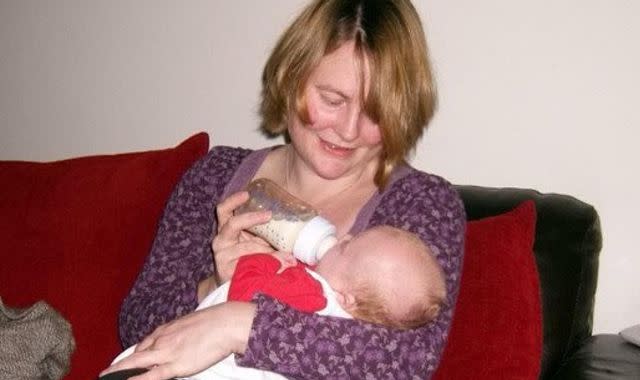Mother left with life-long injuries after giving birth breaks 'silence' in bid to help others

When Gill Castle became pregnant with her first child in 2011, she was over the moon. She had a healthy, straightforward pregnancy, but her labour was traumatic.
"I remember saying to my mum, I have gone into hospital perfectly healthy, a working police officer, and I have come out disabled, without my job," Gill reflects.
"All I wanted was a baby."
Warning - this report contains graphic content including descriptions of injuries
Gill's son was premature and got stuck in the birthing canal. As his heart rate dropped, medics used forceps to save his life.
But "in doing so, they unfortunately also really significantly damaged me...", says Gill.
As a result of the complicated delivery, Gill was left with a severe tear.
"I had a hole between my rectum and my vagina. So I was pooing out of my vagina," Gill explains.
"Ultimately seven days after the birth, I was fitted with an emergency colostomy, which is a stoma, which I still have. Subsequently, I lost my job as a police officer due to my really severe mental health problems."
Gill has chosen to share these details because she says she is "sick of the silence" surrounding women's health, and is among the contributors to the very first all-party parliamentary inquiry into birth trauma.
The inquiry, led by Stafford MP Theo Clarke, was set up to address the fact that around 30,000 women each year in the UK will experience birth trauma.
Birth trauma is defined as having suffered physical or emotional distress during or after delivery. It's so severe for some that around one in 20 women also develop PTSD.
It's a subject that's very personal to Ms Clarke, who shared her very own birth trauma story in parliament earlier in the year.
She was taken for urgent surgery after bleeding heavily from a tear.
"I actually thought it was really important to share my story," said Ms Clarke.
"I ended up setting up a national inquiry into birth trauma in parliament because, firstly, I was really shocked to discover there hadn't been one before," she added.
Since sharing her story, Ms Clarke says "hundreds of mothers across the UK" wrote into her office to share their experiences, which has helped shape the issues explored in the inquiry.
"It was very clear to me there was a huge problem with disparities in access to services for those people who had either psychological or physical trauma, like myself.
"What I really hope is this inquiry will come up with practical recommendations for the prime minister, and say 'this is what mums are telling us they need'."
Click to subscribe to the Sky News Daily wherever you get your podcasts
Ms Clarke hopes that by sharing her story and hearing thousands of others, it will raise awareness of the trauma some women experience after birth.
This is a focus of MASIC, a charity which supports women who have experienced physical birthing injuries and says such injuries are sometimes missed during birth, and dismissed after.
"There is a real postcode lottery of care," says Chloe Oliver, chief executive of MASIC.
"The waiting list might be quite long to see pelvic health and physio specialists, and all the time you are trying to look after a baby whilst having really upsetting symptoms."
Read more from Sky News:
Police investigating after dozens of dead animals dumped outside shop
Schoolchildren taught how to treat stab wounds after wave of attacks
MASIC is currently collating data to try to establish the emotional and financial "cost of injuries" relating to birth trauma. Not just the cost to the NHS, but the personal cost to families too.
"It impacts on your family relationships, your work life, you may not be able to go back to the job you had before you were pregnant. You know, your life completely changes and you have to live with that," says Ms Oliver.
A Department of Health and Social Care spokesperson said: "We are committed to making the NHS the safest place in the world to give birth, and that's why birth trauma support is among the top priorities for the Women's Health Strategy in 2024.
"We're increasing investment in maternity services to £186m per year from next month, to grow the maternity workforce and improve maternity and neonatal services across England. On top of that, an extra nearly £35m was announced at the Spring Budget to improve maternity safety."


